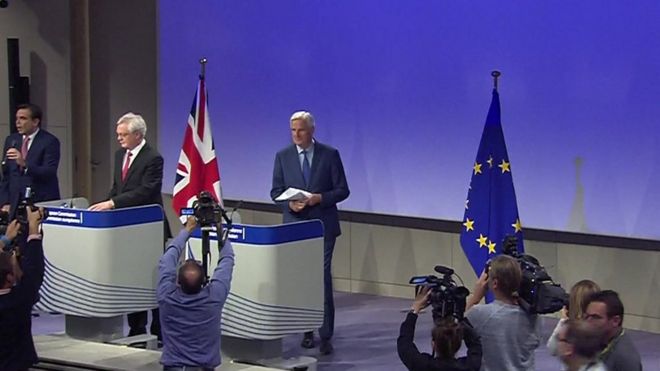
The EU's chief negotiator Michel
Barnier says there has not been enough progress to move to the next
stage of Brexit talks as the UK wants.
He said there was "new
momentum" in the process but there was still "deadlock" over the
so-called divorce bill, which he said was "disturbing"."Decisive progress is in our grasp within the next two months", he added.
This week's fifth round of talks are the final discussions before a crucial EU summit on 19 and 20 October.
- Brexit: All you need to know
- A guide to key issues in EU-UK talks
But Mr Barnier said: "I am not able in the current circumstances to propose next week to the European Council that we should start discussions on the future relationship."
The UK's Brexit Secretary David Davis said there had been progress on the area of citizens rights that had moved the two sides "even closer to a deal".
Mr Barnier said Theresa May's announcement that Britain would honour financial commitments entered into as an EU member was "important".
But he said there had been no negotiations on the issue this week because the UK was not ready to spell out what it would pay.
"We confined ourselves to technical discussions - useful discussions, but technical discussions.
"On this question we have reached a state of deadlock which is very disturbing for thousands of project promoters in Europe and it's disturbing also for taxpayers."
The UK is set to leave the European Union at the end of March 2019.
- What would "no deal" look like?
- Donald Tusk warns over 'slow pace' of talks
The EU has said it wants "sufficient progress" on issues including a financial settlement, citizen's rights and the Northern Ireland border before the talks move on to trade.
Earlier this week, European Council President Donald Tusk warned that if the current "slow pace" of negotiations continued the UK and the EU would "have to think about where we are heading".
He suggested that the green light to begin talks about a post-Brexit trade deal would not come until December at the earliest.
Last month Prime Minister Theresa May used a speech in Florence to set out proposals for a two-year transition period after the UK leaves the EU in March 2019, in a bid to ease the deadlock.
Conservative MP Kwasi Kwarteng, Parliamentary aide to Chancellor Philip Hammond, played down reports of a cabinet row over whether money should be spent now on preparing for Britain's exit from the EU without a trade deal.
He told BBC Radio 4's Today programme there were "slight differences of opinion" but the government is "going to be prepared for every eventuality".
Labour's Hilary Benn, chairman of the Commons Brexit committee, said it would be "a disaster for Britain if we ended up with no deal" and talk of the UK being relaxed about that "I don't think convinces anyone".
He urged ministers to stop arguing amongst themselves because the "clock is ticking".
"All the signs coming from Brussels are that when the European Council meets, it will say, I'm sorry there hasn't been enough progress," he added.
Originally published on http://www.bbc.com/news/uk-politics-41585430




0 comments:
Post a Comment